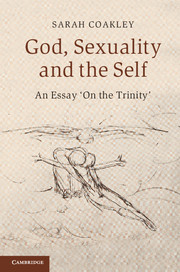Book contents
- Frontmatter
- Contents
- Illustrations
- Preface and acknowledgements
- Abbreviations
- Prelude: the arguments of this book
- Chapter 1 Recasting ‘systematic theology’: gender, desire, and théologie totale
- Chapter 2 Doing theology ‘on Wigan Pier’: why feminism and the social sciences matter to theology
- Chapter 3 Praying the Trinity: a neglected patristic tradition
- Chapter 4 The charismatic constituency: embarrassment or riches?
- Chapter 5 Seeing God: trinitarian thought through iconography
- Chapter 6 ‘Batter My Heart’: reorientations of classic trinitarian thought
- Chapter 7 The primacy of divine desire: God as Trinity and the ‘apophatic turn’
- Coda: conclusions and beyond
- Glossary of technical terms and names
- Scripture index
- General index
- References
Chapter 7 - The primacy of divine desire: God as Trinity and the ‘apophatic turn’
Published online by Cambridge University Press: 05 June 2014
- Frontmatter
- Contents
- Illustrations
- Preface and acknowledgements
- Abbreviations
- Prelude: the arguments of this book
- Chapter 1 Recasting ‘systematic theology’: gender, desire, and théologie totale
- Chapter 2 Doing theology ‘on Wigan Pier’: why feminism and the social sciences matter to theology
- Chapter 3 Praying the Trinity: a neglected patristic tradition
- Chapter 4 The charismatic constituency: embarrassment or riches?
- Chapter 5 Seeing God: trinitarian thought through iconography
- Chapter 6 ‘Batter My Heart’: reorientations of classic trinitarian thought
- Chapter 7 The primacy of divine desire: God as Trinity and the ‘apophatic turn’
- Coda: conclusions and beyond
- Glossary of technical terms and names
- Scripture index
- General index
- References
Summary
In this, the last full chapter of this first volume of systematics, it remains only for me to gather together the fragments of theological reflection I have scattered upon the mountains, and trust that they constitute at least an interesting foretaste of the larger potential of a théologie totale, if not of a full eucharistic banquet. Let me explain at the outset what is still to be attempted here.
First, my explorations of the multilayered evocations of trinitarian discourse in this book have, I hope, convinced the reader of at least this much: that no trinitarian language is innocent of sexual, political, and ecclesiastical overtones and implications, and that it is a primary task of a théologie totale to ferret out these implications, and to bring them to greater critical consciousness. The redoubtable Baroness von Blixen (the Danish author of Out of Africa, who wrote under the pen name Isak Dinesen) once remarked in a letter that, as far as she was concerned, the Trinity was merely, ‘The most deadly dull of all male companies’. Our own investigations have hardly found dullness to be the major drawback of trinitarianism; more truly could we characterize it as a heady mixture of ‘love and pain and the whole damn thing’ (to summon a memorable film title from the 1970s), since no major passion has been absent from the complexity of meanings that we have found trinitarian language and art to disgorge, given the tools of a théologie totale.
- Type
- Chapter
- Information
- God, Sexuality, and the SelfAn Essay 'On the Trinity', pp. 308 - 339Publisher: Cambridge University PressPrint publication year: 2013



